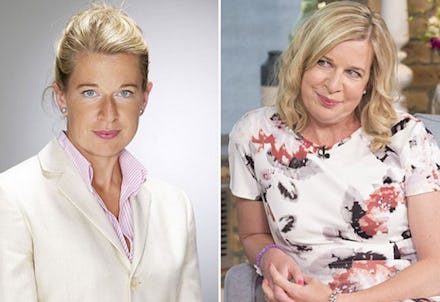This Woman Gained 50 Pounds to Prove You 'Can't Be Fat and Happy'

Talk about the opposite of loving the skin you're in.
For anyone wondering why some people resent the "thinner is better" messaging relentlessly perpetuated by marketers, pop culture and Hollywood, look no further than this British woman's sad example of how not to talk about weight loss.
Kate Hopkins has been skinny almost all of her life — she's even been celebrated for her looks. But in an odd reversal, the reality TV personality binge ate more than 6,500 calories a day in an attempt to gain 50 pounds.
Why did Hopkins attempt such an odd stunt? In order prove there are "no excuses for being overweight," of course.
Here she is before the weight gain:
And here's Hopkins baring a bigger belly:
Known for her incendiary remarks across the pond, Hopkins was "inspired" to undergo the problematic experiment after a February appearance on the Irish talk program The Late Late Show. Hopkins was challenged during the show for the many, cruel tweets and hateful remarks she had made against fat people in the past:
"I don't believe you can be fat and happy. I think that's just a cop out," she told host Ryan Tubridy. "It's living a lie. It's not having the balls to cope with things and make a conscious effort to say, 'I'm going to do something about the state I've gotten myself in.'"
Hopkins was then confronted by Andrea, an audience member who roundly rejected Hopkins' theory, noting that she was a fat woman who was perfectly happy with her appearance and lifestyle.
"Katie, you're looking at me here. I'm size 26, 18 stone and 45 years old," Andrea said, explaining that she weighs more than 250 pounds. "You said you've never seen a fat and happy person. You're looking at one." At this point, Hopkins interrupted to ask why the audience was clapping for a woman who she thought was big, fat and sloppy.
Apparently that moment struck a chord for Hopkins, although probably not the one that Andrea was hoping for: Hopkins decided she was going to prove that people like Andrea are wrong. It's all part of a new documentary project to be aired on TLC called Fat and Back.
In the process, Hopkins apparently consumed a daily regimen of 6,500 calories, including many fatty, sugary and carb-filled foods, chronicling everything in a food journal in front of the cameras, according to TODAY. Her extreme routine was no easy task, as the cameras also documented her in moments of apparent despair over her body's changes.
"I didn't cry at childbirth. I didn't cry at my wedding. but I cried over this because I was just so disgusting," she said in the film. "I've learned a lot about how it feels to be big, how difficult it is to be big, how horrible it is to have fat sitting on the top of your thighs, and how much more challenging it is just to do everyday life when you're bigger."
While on the surface it might seem like Hopkins actually did learn something productive from her experience, these "skinny tears" are being shed for all the wrong reasons.
Now, well into the weight loss phase, Hopkins has lost roughly 35 pounds, with about 15 more to go in the next several weeks. Sticking to the formula of "eat less, move more," Hopkins is sticking to an oversimplified idea of weight and body mass that belies what is actually a complicated issue for many. Even more unfortunately, these types of statements are often used to reinforce harmful myths and stereotypes about fat people that in no way help advance what is an important conversation.
Size, health, weight loss and body image are intersectional issues that have led to social and institutionalized discrimination against fat people. For one, various health conditions preclude people from being able to diet their way to a smaller waist. And a crisis in the availability of affordable groceries makes it all the more difficult for as many as 10% of Americans to eat fresh and healthy food, a phenomenon otherwise called "food deserts."
Instead of working toward a productive solution, Hopkins' quest comes across more as a childish game of fat-shaming rooted in ignorance and an ugly prejudice that equates body size with stereotypical lifestyle and personality attributes. In the process, she's making it all the more difficult for people of all sizes to embrace and work toward a healthy body image, while at same time encouraging negative stigmas that actively enforce a counterproductive cycle of negative reinforcement.
In reality, there's health and beauty at every size — if only Hopkins could stop shaming others for enough time to realize it.